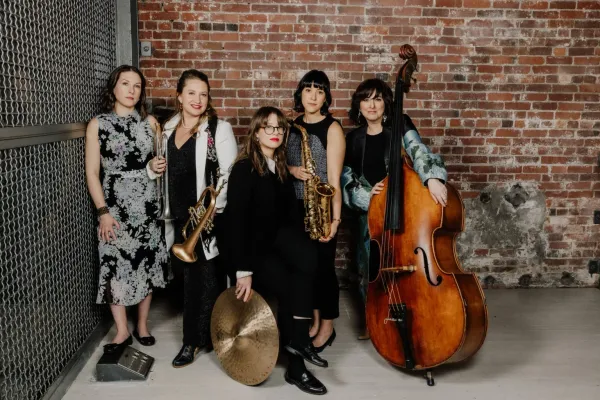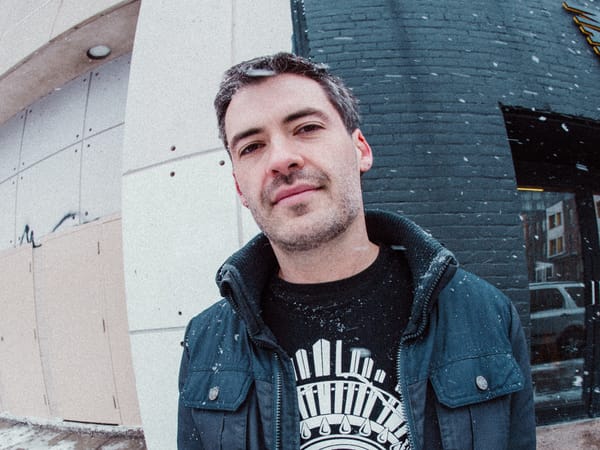You're too old for this, part 2 featuring Rollie Pemberton
The no good, very bad Cadence Weapon tour outcome; tour economics is a trending topic

Rollie Pemberton – the artist known as Cadence Weapon – is a Polaris Music Prize winner and one of our country's most interesting hip-hop creators. Originally from Edmonton, he's also an author; that book in the photo is his.
On October 31, 2022, Rollie contributed an article about his recent US touring experience to Toronto Life magazine, titled "Musicians like me can no longer afford to tour. Live music won’t survive unless the industry changes".
Rollie also spoke to CBC News last week and said:
"What was always kind of a risky thing, going on tour – where it was like, y'know, maybe you're gonna break even, maybe you'll lose a little money – has become just, it's not even worth it for your average artist to get on the road anymore.
Today, I'll pick up where I left off on this subject, and draw from Rollie's book and magazine article to ultimately ask: is it worth it for the average artist to tour anymore?
Touring economics: a trending topic
I wrote a piece last year called "You're too old for this (in the best way)". The economic challenge of touring was already a trending topic then, but now a trend of well-known acts cancelling their tours has drawn even more attention to it.
One of the biggest cancellations came from the influential indie pop group Animal Collective, who were supposed to tour Europe this month but cancelled those dates.
Rollie responded to the news. His tweets, which began, "Small to midsized 'get in the van' music tours will become a thing of the past soon," got written up in Exclaim.
The van image plays with something I wrote previously, about a young indie rock band going to South by Southwest:
"There's a reason that "sleep in the van to save money" was the most common reply [...] Why wouldn't it be when you can identify lodging as the biggest expense?
"But low revenue is the problem with this tour, not expenses. Wednesday's average revenue per show was $347.33 for those six gigs; it's not enough to fuel even the most austere five-piece band."
With that in mind, let's give our undivided attention to Rollie Pemberton.
Enter the Bedroom Rapper
I had to finally read Rollie's book to understand him better.
Rollie is a man of the 2000s and of the blog era, having written for Pitchfork and holding fond memories of working at HMV. Without spoiling his book, I'll say he comes to a pretty serious I'm too old for this moment and takes control of his career once and for all, setting himself on course for his 2021 Polaris win.
(But then he cuts from the climax of his story to tell an insightful history of trap music – even if he feels ambivalent about his years reviewing albums, you can't take the journalist out of him!)
There is plenty of ink in Bedroom Rapper dedicated to Rollie not taking home the money he deserves to take home at various points. And he's just as candid now, talking about his recent US tour in the Toronto Life magazine article.
Diving into the tour
When you get down to the numbers, according to Rollie in Toronto Life, this is what actually happened.
First, he sets the scene: "Last fall, after I won the 2021 Polaris Prize for my album Parallel World, I went on a 12-date US tour."
Then, "My overall expenses for a relatively bare-bones tour were $21,161.68."
And to complete the equation, "Even with the $7,000 in tour-support funding I’d received, I lost $2,098.86."
If his numbers are true and my interpretation of how he shared them is accurate, Rollie earned (not including the "tour-support funding") just over $12,000 gross from the tour.
For "a 12-date US tour", that’s about $1,000 per show.
I guess that wouldn't be bad for jazz, would it? Well, think about how much cheaper it is to hit at a jazz club versus bring a popular music production on the road.
With revenue that low, this tour's economics were dead in the water — it was a bad financial decision. You can’t make up the big costs of performing in America, tour production, and lodging on $1,000 a show for only 12 shows. You just can't.
I get why Rollie might not want to frame his story with that number. It feels low, and it's what my own band was able to do in Canada circa 2019, guarantees plus merch. We did well on $1,000 a show because we were a one-car folk band with no big production, often getting billeted by local folkies.
I just think there is undue focus on how expensive touring is when you consider that, for most of the hard-luck touring stories trending today, low revenue is still the problem.
It's as I wrote back in April regarding that small indie band burning cash on tour:
"[O]ne of the things they'll get out of this trip is a higher standard for what makes a tour viable: the ability to look at expected revenues that are too small and say, 'I'm too old for this.'
You can do that at any age, if you have the right mix of BS detection, ambition, and life experience."
Whoever put Rollie out there (which could be himself in part!) probably knew he would lose money, which sucks – especially having read his book. He deserves better, he always has.
So is it true?
Is it worth it for the average artist to tour? That was the question Rollie hit on, the one that's been trending around the tour cancellations.
The answer I'm left with after reading Bedroom Rapper is: yes, it's worth it if you're in control. When a bad manager, failing label, or difficult bandmates drive you down the wrong paths, it'll suck.
But if you choose to get on the road with your own clear view and your passion, no one can tell you it isn't worth it – numbers be damned.
All of Rollie's work speaks to that; I have no doubt that he'll continue to chart his own path and stay in the game, despite the challenges of touring.




